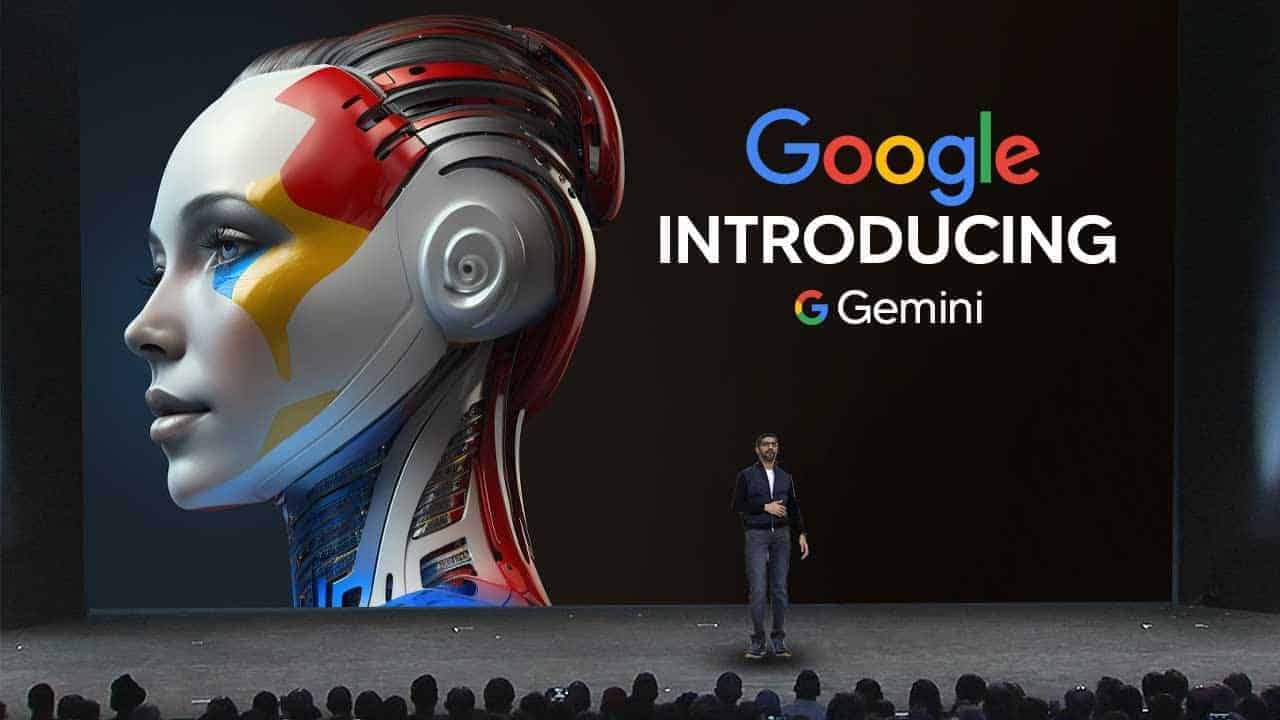The Google Gemini project is a big plan to change artificial intelligence. It can handle different kinds of data, solve problems, and work more effectively. It can be used in many ways. But we need to think about the problems that might come up as it’s being developed and used. This is important so that everyone can benefit from it. Google announced the Gemini AI project at I/O 2023, but waited to launch it in 2024.
The delay was because of difficulties with handling queries in languages other than English. Google wants to make sure its technology can compete with OpenAI’s GPT-4. Gemini is not just another AI model; it shows Google’s dedication to making AI better and making it work well with products like Bard, Google Assistant, and Search. Despite this delay, it shows how hard it is to create AI technology that works with many languages and situations.
When and Why was Bard Renamed to Gemini?
Google renamed its conversational AI chatbot from Bard to Gemini in February 2024. This move aimed to unify Bard with Duet AI, another AI-powered collaboration tool, under the Gemini brand. The change also reflected Google’s broader strategy to position Gemini as its most capable family of models, highlighting its versatility and potential across various applications.
Unveiling Gemini: Google’s Next-Gen AI
What is Google Gemini?
Google Gemini is an advanced AI model developed by Google. It is multimodal, meaning it can understand and generate various types of content, including text, images, and even code. Gemini is designed to be more powerful and versatile than previous AI models, making it a potential game-changer in the field of artificial intelligence.

Features and Capabilities
Gemini boasts several key features and capabilities that set it apart:
- Multimodal Understanding: It can process and understand different types of information, such as text, images, and code.
- Enhanced Problem Solving: It can solve complex problems and generate creative solutions.
- Improved Efficiency: It can run on a variety of devices, from data centers to mobile phones.
- Scalability: It is designed to scale and adapt to different tasks and domains.
Applications and Potential Impact
Gemini has the potential to revolutionize various fields and applications:
- Natural Language Processing: It can be used for language translation, text summarization, and chatbot development.
- Computer Vision: It can be used for image recognition, object detection, and video analysis.
- Code Generation: It can be used to generate code snippets, automate software development tasks, and assist programmers.
- Creative Content Generation: It can be used to generate images, music, and other forms of creative content.
Availability and Access
Gemini is currently in development, and Google is gradually rolling out access to developers and researchers. It is expected to be available through Google’s AI platform, Vertex AI, and other Google Cloud services.
Concerns and Challenges
While Gemini holds immense promise, there are also concerns about its potential impact on jobs, privacy, and security. It is important for Google and other stakeholders to address these concerns and ensure that Gemini is used responsibly and ethically.
| Feature/Capability | Description |
|---|---|
| Multimodal Understanding | Processes and understands various types of content like text, images, and code. |
| Enhanced Problem Solving | Solves complex problems and generates creative solutions. |
| Improved Efficiency | Runs on a variety of devices, from data centers to mobile phones. |
| Scalability | Designed to scale and adapt to different tasks and domains. |
| Applications | Potential uses in natural language processing, computer vision, code generation, and more. |

Delving Deeper into Google Gemini
Gemini’s Multimodal Prowess
Gemini’s multimodal capabilities truly set it apart. Imagine asking Gemini to “write a funny poem about a cat riding a unicorn.” Gemini can not only generate the poem but also create an accompanying image! This seamless blending of text and image understanding opens up exciting possibilities. It could revolutionize image search, allowing users to find images based on complex descriptions. Or imagine a virtual assistant that can understand the context of an image you show it and provide relevant information or perform actions. This is the power of Gemini’s multimodal approach.
Comparing Gemini’s Multimodal Capabilities
While other models like GPT-4 can also process images, Gemini’s approach is unique. It’s designed to understand the interplay between different modalities, not just treat them as separate inputs. This allows for a deeper level of comprehension and more nuanced outputs. For instance, Gemini might be better at understanding humor or sarcasm in an image because it can consider the accompanying text or the broader context.
Under the Hood: Architecture and Training
Though Google hasn’t revealed all the details, we know Gemini leverages a transformer-based architecture, similar to other large language models. However, it likely incorporates novel techniques to handle multimodal information effectively. The training process is crucial. Gemini was likely trained on a massive dataset of text, images, code, and other data forms. This data helps Gemini learn the relationships between different modalities and generate coherent and relevant responses.
Navigating the Ethical Landscape
With great power comes great responsibility. Google is aware of the ethical considerations surrounding Gemini. Bias is a major concern with any AI model. Google is likely employing techniques like data augmentation and fairness constraints during training to mitigate bias. They are also likely developing tools to detect and flag problematic outputs. Misinformation is another challenge. Google may implement safeguards like watermarking Gemini’s creations and collaborating with fact-checkers to combat misuse.
The Future Shaped by Gemini
Gemini is poised to reshape our digital interactions. Imagine personalized AI tutors that adapt to your learning style, AI-powered design tools that generate creative assets based on your sketches, or even AI companions that provide emotional support. Gemini could also break down language barriers in unprecedented ways, enabling real-time translation in virtual meetings or facilitating cross-cultural communication. The possibilities are vast.
Enhanced FAQs
| Question | Answer |
|---|---|
| How can developers access and use Gemini? | Google is gradually rolling out access to Gemini through its AI platform, Vertex AI, and other Google Cloud services. Developers can apply for access and explore the various APIs and tools available. |
| What are the costs associated with using Gemini? | Pricing details will likely depend on the specific services and usage levels. Google may offer different pricing tiers for developers, researchers, and businesses. |
| Will Gemini be available in languages other than English? | Yes, Google has emphasized its commitment to supporting multiple languages. While the initial launch may focus on English, expect to see support for other languages expand over time. |
| How does Gemini compare to other Google AI models like LaMDA? | Gemini is positioned as Google’s most capable AI model to date. It surpasses LaMDA in its multimodal capabilities and its potential for integration across various applications. |
The Significance of Gemini AI
Gemini AI represents a leap forward in Google’s AI capabilities. It’s not just about competing with existing models like GPT-4 but about pushing the boundaries of what AI can achieve. The focus on overcoming language barriers is particularly noteworthy. In a world increasingly connected yet linguistically diverse, the ability of AI to understand and interact in multiple languages is crucial. This feature alone sets Gemini apart, promising a more inclusive and accessible AI experience for users worldwide.
The Impact on Google’s Existing AI Products
The integration of Gemini into Google’s existing suite of AI-enhanced products is a game-changer. Imagine a more intuitive Google Assistant, a smarter Bard, and a Search engine that understands context and nuances like never before. This integration signifies a holistic approach to AI development, where advancements in one area ripple across an entire ecosystem of products, enhancing user experience and utility.
Challenges and Expectations
The delay in Gemini’s launch highlights the challenges inherent in AI development. Dealing with non-English queries isn’t just a technical issue; it’s about understanding cultural nuances, dialects, and idioms. This level of linguistic sophistication is a tall order, and Google’s commitment to getting it right speaks volumes about their dedication to quality and user experience. The AI community and users alike have high expectations for Gemini, anticipating a model that not only matches its competitors but sets new standards in AI capabilities.
The Broader AI Landscape
Google’s Gemini project is a part of a larger narrative in the AI landscape. The competition among tech giants to develop the most advanced AI models is fierce. Each new development, be it from Google, OpenAI, or other players, pushes the industry forward, challenging existing paradigms and opening new possibilities. This competitive environment fosters innovation and rapid advancement, benefiting not just the tech industry but society as a whole.
The Future of AI
As we look towards the launch of Gemini AI, it’s clear that we are on the cusp of a new era in artificial intelligence. The advancements in language processing and integration across multiple platforms point to a future where AI is more than just a tool; becomes a part of our day to day life. The potential for AI to bridge language gaps, enhance communication, and provide more personalized and intuitive experiences is immense, and Gemini AI is at the forefront of this revolution.
FAQs
What is Google’s Gemini AI?
Gemini AI is Google’s upcoming AI model, announced at I/O 2023, designed to rival OpenAI’s GPT-4. It focuses on advanced language processing and integration with Google’s existing AI products.
Why was the launch of Gemini AI delayed?
The launch was delayed to 2024 due to challenges in handling non-English queries, indicating Google’s commitment to linguistic diversity and quality.
How will Gemini AI impact Google’s existing products?
Gemini AI is expected to enhance Google’s existing AI-enhanced products like Bard, Google Assistant, and Search, offering more intuitive and sophisticated user experiences.
What makes Gemini AI different from other AI models like GPT-4?
Gemini AI’s focus on overcoming language barriers and its integration with a wide range of Google’s products sets it apart from other models.
What does the delay in Gemini’s launch signify in the AI industry?
The delay highlights the complexities of AI development, especially in creating linguistically diverse models, and Google’s dedication to quality and user experience.
How will Gemini AI affect the broader AI landscape?
Gemini AI’s launch will contribute to the competitive and innovative environment in the AI industry, pushing forward advancements and setting new standards.
What are the challenges faced in developing Gemini AI?
The main challenge is achieving a high level of linguistic sophistication, understanding cultural nuances, dialects, and idioms in multiple languages.
What is the significance of focusing on non-English queries in AI development?
Focusing on non-English queries is crucial for creating inclusive and universally applicable AI models, catering to a linguistically diverse global audience.
How does the development of Gemini AI reflect Google’s approach to AI?
Google’s approach to AI, as seen in the development of Gemini, is holistic, focusing on quality, inclusivity, and integration across its product ecosystem.
What future advancements can we expect from AI models like Gemini?
Future advancements include more sophisticated language processing, better understanding of cultural contexts, and seamless integration across various platforms and applications.







